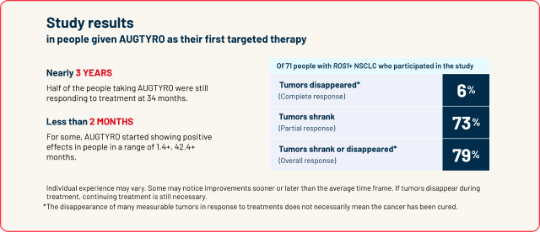STUDY RESULTS
AUGTYRO® ROS1+ NON-SMALL CELL LUNG CANCER STUDY RESULTS
People with ROS1+ non-small cell lung cancer can be treated with AUGTYRO as their first targeted therapy.
In a study of 71 people with ROS1+ lung cancer, they were given AUGTYRO as their first targeted therapy. They received AUGTYRO starting at 160 mg orally once daily for 14 days, and then their dose was increased to 160 mg twice daily until their doctor recommended otherwise.

POSSIBLE SIDE EFFECTS
POSSIBLE SIDE EFFECTS TO LOOK OUT FOR
During treatment with AUGTYRO, side effects may occur. It’s important to be mindful, track changes, and assess how you’re feeling.
Rely on your care team
To have helpful conversations with them, remember to let your team know if you are experiencing any new or different symptoms at any time during your treatment.
AUGTYRO may cause serious side effects, including:
- Central nervous system (CNS) effects
- Lung problems (pneumonitis)
- Liver problems
- Muscle problems
- Increased uric acid in your blood (hyperuricemia)
- Bone fractures
The most common side effects of AUGTYRO include:
- Dizziness
- Change in sense of taste
- Feeling of numbness or tingling in your arms or legs
- Constipation
- Shortness of breath
- Tiredness
- Trouble with balance, coordination, and walking
- Problems with thinking, such as forgetfulness or confusion, memory problems and hallucinations
- Muscle weakness
- Nausea
The most common side effect? Dizziness.
At any point in your treatment, you may experience dizziness. Let your healthcare team know if you do. Do not drive or operate machinery until you know how AUGTYRO affects you. If you experience dizziness, do not drive or operate machinery until your symptoms have resolved.
Here are some things you can do that may help manage dizziness:
Drink plenty of fluids daily. Aim for 8 to 12 eight-ounce glasses of water or other fluids every day. |
Avoid drinking a lot of caffeinated beverages including coffee, tea, and soda. |
Avoid moving suddenly. For example, sit up carefully from a lying position. If you get dizzy when you stand up, hold a chair or table for balance and stand up more slowly than usual. |
Sit or lie down immediately. The possibility of losing your balance could lead to falling or serious injury. |
The tips provided here are for informational purposes only and are not meant to replace a physician's medical advice. Please contact your healthcare team if you are experiencing dizziness and ask your doctor if these tips may be right for you.
